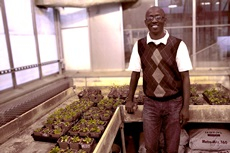Research to Fight Pathogens That Infect Canola Takes Root at Rutgers–Camden
Research that will help to fight soil-borne pathogens that infect canola plants is taking root at Rutgers University–Camden.

Canola is oil produced from the seed of several varieties of plant known as Brassica rapa, which includes leafy vegetables like cabbage or broccoli. These plants are very susceptible to a pathogen that causes clubroot, a common disease that cuts off the plant’s water and nutrient intake, can stunt growth and seed production, and can cause the plant to die.
Simeon Kotchoni, an assistant professor of biology at Rutgers–Camden, is part of a collaborative research team that has found an innovative way to combat clubroot. Kotchoni says canola breeders have attempted to genetically manipulate the plants to prevent the pathogen from spreading, but clubroot resistant genes are limited and the disease can evolve to override the resistance.
“We’re trying to find a way to manage this disease once and for all, and we came up with a very unusual method to help eradicate it,” Kotchoni says.
Instead of seeking a “cure” within the Brassica plants, Kotchoni and his fellow researchers are using common grass — a “non-host” to the clubroot pathogen — to pinpoint resistant genes.
“We inoculated the roots of the grass and just let it grow, then compared it to samples that were not infected,” Kotchoni explains. “The inoculated grass was not affected by the clubroot, and that was a major breakthrough. We’ll be able to understand how the grass was able to overcome the pathogen, and bring that gene over to the canola so that it can fend off the clubroot.”
The next step is to engineer canola with the resistant genes and then test the canola plants to see how they respond to the clubroot pathogen.
The research finding is like a similar discovery in tobacco, which is a non-host to a pathogen that infects rice and has been used to help rice build resistance to the pathogen. Kotchoni’s study is the first to look in a non-host species for clubroot resistance in canola.
“This project is the roadmap to efficiently tackle clubroot disease and other soil-borne pathogens that affect various plants,” Kotchoni says.
The research project is being done in collaboration with Tagnon Missihoun, a post-doctoral fellow at the University of Saskatchewan who will come to Rutgers University–Camden to work with Kotchoni later this year.
Kotchoni and Missihoun are working in conjunction with Peta Bonham-Smith and Yangdou Wei, professors at the University of Saskatchewan. The research is being funded by Saskatchewan’s Agriculture Development Fund and the Saskatchewan Canola Development Commission.
“Rutgers–Camden is a desirable and compelling place to do such research,” Kotchoni says. “We’re in a great situation in which state-of-the-art technology can be used for a collaborative research project of this magnitude. We don’t have to send out our samples to a lab in another location. We can analyze everything right here at Rutgers–Camden, and our students can do this research on their own, teaching them the skills they need upon graduation.”
A Marlton resident, Kotchoni earned his bachelor’s degree from the University of Benin; master’s degrees from the University of Benin and Obafemi Awolowo University in Nigeria; and his doctoral degree from the University of Bonn in Germany.